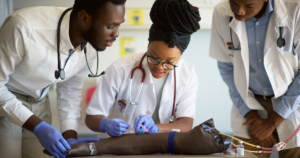The Best Fluffy Pancakes recipe you will fall in love with. Full of tips and tricks to help you make the best pancakes.
Top Medical Certificate Programs for Healthcare Technicians

Medical certificate programs are essential for providing healthcare technicians with the skills and information they need to succeed in their employment in the constantly changing sector of healthcare. These programs offer specialized training in a range of healthcare fields, empowering technicians to carry out certain duties and contribute to the efficient operation of healthcare institutions. In this post, we’ll look at the best medical certificate programs for healthcare technicians and the plethora of job chances they offer.
The value of medical certificate training for healthcare professionals
Healthcare technicians can gain a lot from medical certificate programs. They offer a targeted and thorough education that equips students to carry out particular duties and obligations within the healthcare sector. These courses give technicians a deeper understanding of the fundamental ideas and recommended procedures in their particular domains in addition to improving their technical skills.
Top Medical Certificate Programs for Healthcare Technicians

Medical Coding and Billing Certificate Course: This course instructs technicians in the intricate system of medical coding and billing, which entails giving codes to diagnoses and treatments in order to accurately charge for and receive reimbursement.
Phlebotomy Certificate Course: The art of taking blood samples from patients is a skill that phlebotomy technicians learn. This expertise is essential for diagnostic tests and blood donation processes.
Medical Laboratory Technician Certificate Course: In order to help technicians make accurate medical diagnoses, this course focuses on laboratory procedures, including specimen collection, processing, and analysis.
EKG Technician Certificate Course: Electrocardiogram (EKG) testing is a specialty of EKG technicians that check a patient’s cardiac rhythm, analyze it, and look for any anomalies.
Pharmacy Technician Certificate Course: Pharmacy technicians assist pharmacists in the safe and effective delivery of medication by learning about pharmaceuticals, dose calculations, prescription processing, and inventory management.
Medical Transcriptionist Certificate Course: This training prepares technicians to accurately record patient interactions and procedures by turning medical recordings into written reports.
Radiology Technician Certificate Course: The use of imaging tools including X-rays, CT scans, and MRIs by radiology technicians helps doctors diagnose and treat a variety of illnesses.
Surgical Technician Certificate Course: Alongside surgeons, surgical technicians assist with surgical procedures, prepare instruments, and maintain a clean environment in the operating room.
Medical Assistant Certificate Course: In order to support healthcare providers in various settings, medical assistants are trained in both clinical and administrative roles (taking vital signs, helping with exams, organizing medical records, and scheduling appointments).
Health Information Technician Certificate Course: This course focuses on maintaining patient health records’ security, guaranteeing legal compliance, and providing quick access to medical data.
Advantages of Enrolling in Medical Certificate Programmes
For healthcare technicians, taking medical certificate courses has various benefits. These programs give students specialist knowledge and abilities that are highly valued in the healthcare sector, increasing their employability as technicians. Additionally, compared to degree programs, certificate courses are significantly shorter in length, enabling technicians to enter the profession sooner. These courses’ hands-on instruction makes sure that technicians are equipped to manage real-world situations and fosters their competence in their jobs.
Opportunities for Careers as Healthcare Technicians
Medical certificate course graduates with a background in healthcare have a wide range of professional options. The following are some typical places where healthcare technicians can work:
- Hospital and clinical settings: Depending on their area of specialty, technicians might work in hospitals and clinics, helping doctors, nurses, and other healthcare professionals in a variety of roles.
- Ambulatory Care Facilities: These facilities offer outpatient care, and technicians can be essential in dispensing medications, conducting diagnostic tests, and aiding in minor operations.
- Healthcare technicians are engaged by pharmaceutical businesses and research groups to support clinical trials, conduct laboratory testing, and guarantee adherence to regulatory standards.
- firms that make medical devices and equipment: Technicians can work for firms that make medical devices and equipment, where they can help with the creation, upkeep, and troubleshooting of medical equipment. They could carry out equipment installs, offer technical assistance, and make sure that gadgets are calibrated and working properly.
- Home healthcare agencies: Home healthcare technicians are essential to providing patients with medical care in their homes. They could help with managing medications, treating wounds, assisting with mobility, and keeping an eye on vital signs. Healthcare technicians have the chance to develop close bonds with patients and offer individualized care through home healthcare services.
- Government and Public Health Organisations: At the municipal, state, and federal levels, government and public health organizations employ healthcare technicians. They support community health programs, illness surveillance, and public health efforts. Screenings, vaccinations, data collecting, and health awareness campaigns may all be carried out by technicians.
Healthcare Technicians’ Continuing Education and Career Advancement

For healthcare technicians to stay current with their areas’ achievements and to improve their job prospects, continuing education is crucial. The options for further study and career advancement are numerous for technicians after they have successfully completed a medical certificate program. Several possibilities are:
- Advanced Certificate Courses: To increase their knowledge and proficiency in a particular field, technicians might enroll in advanced certificate programs. These programs offer in-depth training and may result in advanced positions or field specializations.
- Associate’s or Bachelor’s Degree Programs: Technicians have the option of enrolling in associate’s or bachelor’s degree programs to further their education. These courses provide a deeper comprehension of healthcare ideas as well as chances for advancement and leadership roles in the workplace.
- Professional Certifications: The credentials of technicians can be strengthened and their marketability increased by obtaining professional certificates relevant to their field. Certified Phlebotomy Technician (CPT), Certified Medical Assistant (CMA), and Certified EKG Technician (CET) certifications are examples of credentials that show competence and commitment to their fields of expertise.
- Continuing Education Units (CEUs): Healthcare technicians must get a specific amount of CEUs to keep their certificates or licenses, according to many professional organizations and licensing bodies. CEU courses address the most recent advancements, industry best practices, and emerging technology to make sure technicians are knowledgeable and up to speed.
Conclusion
Healthcare technicians can obtain the specialized information and skills they need through medical certificate programs to succeed in their careers. Whether it’s radiology, phlebotomy, or medical coding and invoicing, these courses give technicians the skills they need to carry out specific jobs in diverse healthcare environments. With a certificate in hand, technicians have many job options in healthcare settings, including clinics, hospitals, home healthcare organizations, manufacturers of medical equipment, and governmental agencies.
Additionally, pursuing continuing education through degree programs, professional certifications, and advanced certificate courses opens avenues for work growth and higher-level responsibility. Technicians can improve patient care, develop their abilities, and increase their marketability in the cutthroat healthcare sector by remaining up to date with the most recent developments and laws in their profession through continuing education. A proven method to advance and prosper in a rewarding job as a healthcare technician is to invest in medical certificate courses and embrace lifelong learning.
References
- Emergency Medical Technicians’ Experiences of the Challenges of Prehospital Care Delivery During the COVID-19 Pandemic: A Qualitative Study: https://pubmed.ncbi.nlm.nih.gov/35392330/
- Advances in Patient Safety: From Research to Implementation https://www.ncbi.nlm.nih.gov/books/NBK20580/
- Challenges and opportunities for educating health professionals after the COVID-19 pandemic: https://www.ncbi.nlm.nih.gov/pmc/articles/PMC9612849/
- Technology and the Future of Healthcare: https://www.ncbi.nlm.nih.gov/pmc/articles/PMC4147743/




